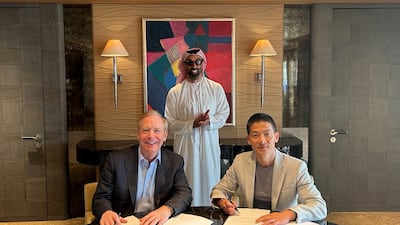Abu Dhabi artificial intelligence and cloud company G42 has received a $1.5 billion investment from Microsoft, which will help to further boost G42's global expansion plans and strengthen the UAE's position as a global technology hub.
The expanded partnership will also include the creation of a $1 billion fund to support developers aimed at enhancing the Middle East's technology talent pool, the companies said in a joint statement on Tuesday.
"Microsoft’s investment in G42 marks a pivotal moment in our company’s journey of growth and innovation, signifying a strategic alignment of vision and execution between the two organisations," said Sheikh Tahnoun bin Zayed, Deputy Ruler of Abu Dhabi and chairman of G42.
As part of the move – which will also focus on bringing AI infrastructure and capabilities to underserved nations – Brad Smith, vice chairman and president of Microsoft, will join G42's board of directors.
"The partnership between G42 and Microsoft is expected to benefit the UAE and the region by providing access to advanced generative AI capabilities, expanding data centre infrastructure, supporting the development of a skilled AI workforce, driving innovation and competitiveness for businesses and positioning the UAE as a leader in AI technology," a G42 representative told The National.
The UAE aims to become a global AI leader and continues to tap into new-age technologies in preparation for the economy and society of the future.
The Emirates has attracted interest for its potential to become a global AI hub, and has pivoted towards partnerships with technology majors from the West.
“We will combine world-class technology with world-leading standards for safe, trusted and responsible AI, in close co-ordination with the governments of both the UAE and the US," Mr Smith said.
In February, Sam Altman, chief executive of generative AI platform ChatGPT maker OpenAI, was said to be in talks with investors, including the UAE government, to raise funds – reportedly to be as much as $7 trillion – aimed at boosting the world’s chip-building capacity to power AI, The Wall Street Journal reported.
Last August, the UAE and Saudi Arabia were reported to have bought thousands of AI chips from market leader Nvidia, as the Arab world's two biggest economies expand their AI strategies, the Financial Times reported.
G42, meanwhile, has been at the forefront of the UAE's AI growth strategy.
In October, G42 unveiled a new entity, Core42, that merged three of its key units – G42 Cloud, its research and development arm Inception and ICT unit Injazat – to focus on delivering AI solutions and services on a national scale.
It also announced a partnership with OpenAI, focusing on using its models in verticals where G42 operates, including financial services, energy, health care and public services.
With the latest Microsoft investment, "we are not only expanding our operational horizons but also setting new industry standards for innovation", said Peng Xiao, group chief executive of G42.
The announcement also continues the long-running partnership between G42 and Microsoft. In April last year, the companies announced a plan to develop AI solutions for the public and industrial sectors.
In September, they forged an agreement to introduce sovereign cloud offerings powered by advanced AI and, in November, Microsoft announced the availability of G42’s Jais Arabic large language model on its new Azure cloud service.
Jais, launched in August, is an open-source bilingual Arabic-English model developed by Inception. At the time, it was said to be the most accurate LLM for Arabic and aimed to bring one of the world's most widely used languages into the AI mainstream.


